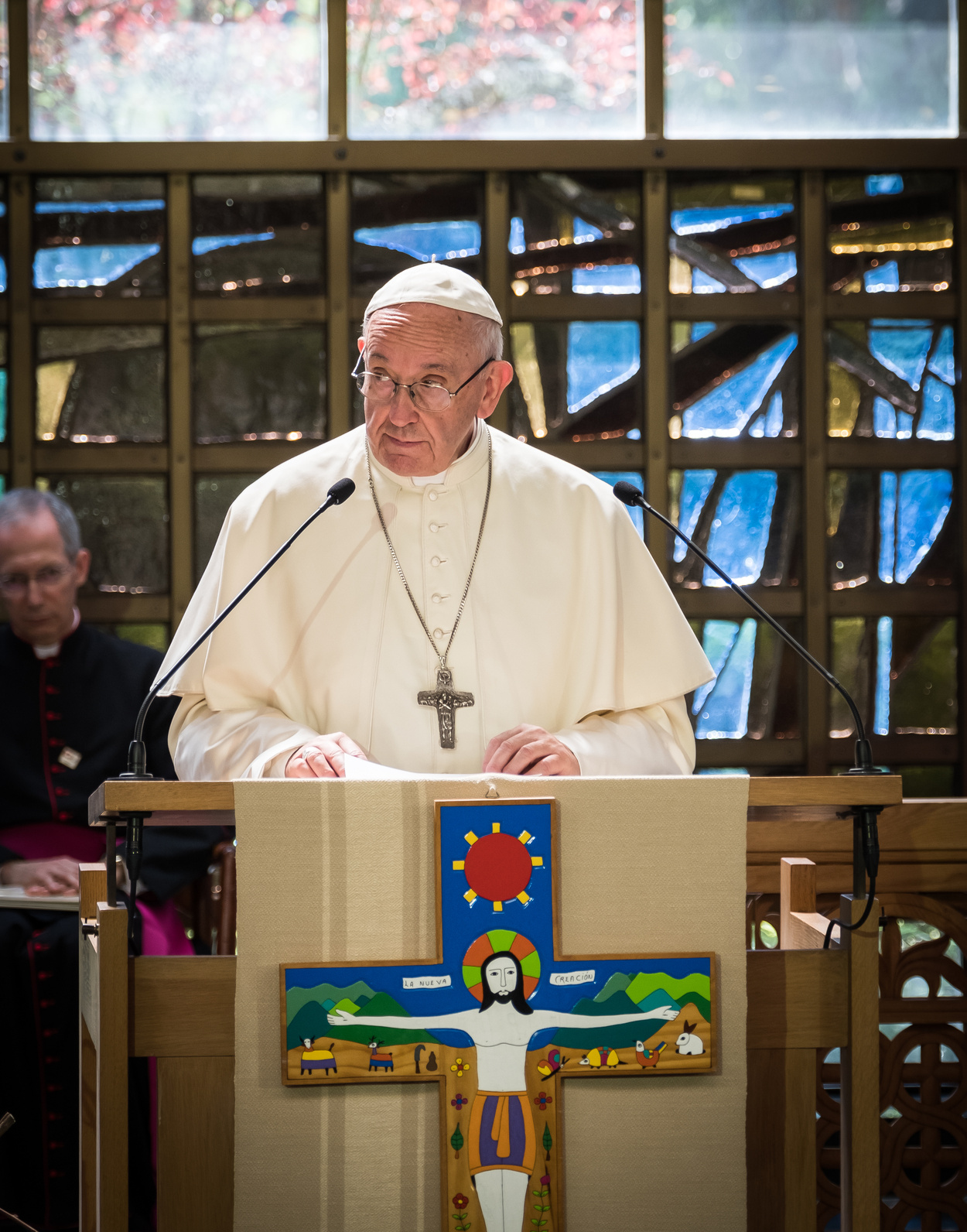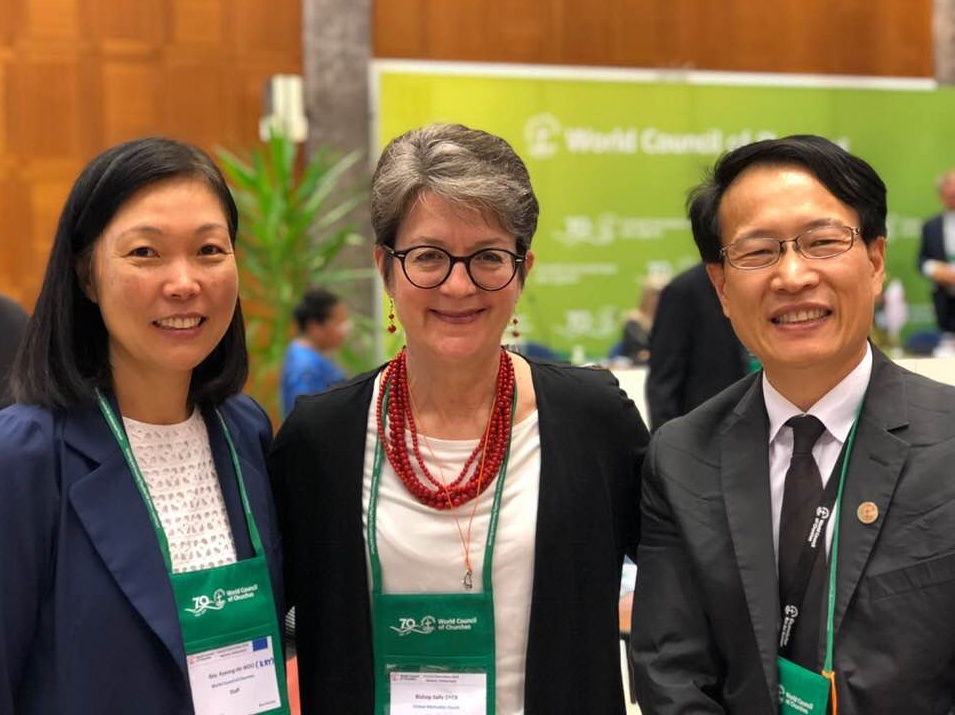Movement in the City, Melrose Park, Suffers Fire
A fire briefly burned in Movement in the City’s (new faith community) Melrose Park campus this morning. Firefighters, who rushed from a nearby station, quickly extinguished the…

Pope Francis participates in an ecumenical prayer service in Geneva, Switzerland at the World Council of Churches 70th anniversary commemoration on June 21, 2018. Pope Francis told the WCC he had come “as a pilgrim in quest of unity and peace.†The visit is only the third by a pope and the first time that such an occasion was dedicated to visiting the WCC. Photo by Albin Hillert/WCC
“Transformational” is a buzzword these days. Like “awesome,” it is often applied to all kinds of things, and frankly often to minor things—like electronic products that we buy. But the meaning of the word is big, if you will. “Transformational” conveys an experience that is truly life-changing. But how many life-changing experiences can you have in a day, month, year or even a lifetime?
I’ve had a couple. One of them was the result of a fellowship I received to be a student at Bossey Ecumenical Institute of the World Council of Churches (WCC) in partnership with the University of Geneva just outside of Geneva, Switzerland during the winter of 1978-1979. Ken and I both attended Bossey following graduation from Boston University School of Theology. We lived for almost 5 months with people from 40 countries and studied “The Holy Spirit and the Ministry of the Church.” As a group, we ate together, talked about life, ministry and the church, and went to places like Taize and finally to the Vatican (where we met Pope John Paul). Oh, yes, we studied together, too!
But the study wasn’t the transformational part of being at Bossey. The transformational part was learning to know and love and better understand people from all over the world and what it’s like to live there and be a Christian there. We’ve maintained relationships with some of them, recently visiting a couple in Europe, and running into others through various occasions (Facebook has helped maintain those relationships).
The transformational part was that we experienced an immense broadening of the horizons of our world. We requested a certain kind of ministry in East Ohio when we returned in spring 1979. And as a result of that choice, too, our lives have been forever changed! Our experience with the WCC was fresh, vibrant and deeply meaningful to us as it informed our urban ministry in Cleveland.
Shortly after we returned from this transformational experience, the World Council of Churches came under attack in the United States due to a Reader’s Digest “expose” about its Programme to Combat Racism. The Programme to Combat Racism was aimed at the dismantling of apartheid in South Africa. But fears, conspiracy theories, and prejudice caused many Christians in the U.S. to withdraw all support and interest in the World Council of Churches. This controversial programme is actually credited with focusing Christians from around the world on the injustice of racism and apartheid in South Africa and in bringing about its demise. But even mentioning any association with the WCC following the early 1980s Reader’s Digest “expose” would get me in trouble (and may still do so) because of people’s strong feelings against it. (Frankly, maybe we need another Programme to Combat Racism today!)
I’ve been on the Central Committee of the World Council of Churches since 2006. The WCC is truly global and ecumenical, including the various Orthodox communions from around the world. While the Catholics aren’t in the fellowship of churches, there is a representative and in June 2018 Pope Francis himself came and spent the day with us at the end of our meeting. Today the WCC includes denominations and church fellowships in more than 110 countries throughout the world, representing over 500 million Christians. It is by far the largest ecumenical organization in the world.
It’s the WCC’s 70th anniversary, being founded on August 23, 1948, in Amsterdam. There were predecessor groups since the 19th century and into the early 20th trying to bring together Christians from around the world. Leaders from more than 100 churches (denominations/communions) voted in 1937-1938 to form a World Council of Churches but World War II broke out and it was delayed in its implementation. After the war, Christians in Europe, North America, and other places sought to address the needs of refugees, migrants and the poor and the WCC gained momentum. (Maybe we do better in our theological differences when we work together rather than just talk about theology!)
During the Cold War, the WCC helped provide a space for East-West dialogue. In the early 1960s world mission and evangelism were added to its focus. It still addresses matters of justice around the world; its present theme is “a pilgrimage of justice and peace” which focuses on overcoming racism, commitment to children, human rights, and care for creation. The WCC is deeply committed to unity, interfaith dialogue, gender justice, nonviolence, theological study, Week of Prayer for Christian Unity, and the Ecumenical Prayer Cycle.

Bishop Dyck catches up with NIC missionaries Rev. Dr. Jin Y. Kim and Rev. Kyeong-Ah Woo in Geneva, Switzerland at the World Council of Churches (WCC) meeting. Rev. Kim is serving as the coordinator of Korean Peninsula Dialogue and Peacebuilding of the WCC and Rev. Woo is serving as Coordinator of the World Mission and Evangelism (CWME) of the WCC.
The United Methodist Church is a strong member of the WCC. We have a number of people who are directly involved in leadership or staff. In addition to me, Cynthia Kent, a layperson and Native American/indigenous person from Greater New Jersey, is a member of the Central Committee. Retired Bishop Mary Ann Swenson is a vice moderator of the Central Committee. United Methodist Women’s General Secretary Harriet Olson is working on a gender justice task force. And the Rev. Jin Yang Kim and Rev. Kyeong-Ah Woo, who are clergy members of the NIC, are General Board of Global Ministries missionaries to the WCC. (When I was in Geneva in June, I was able to spend some time with them and their son, Micah.)
I find the WCC to be a unique lens through which to view the world, the Church universal, and my own faith. I read the gospel and the world news differently because of my awareness of a God and a faith that is big! Globally big, historically big, liturgically big, and even relationally big.
A fire briefly burned in Movement in the City’s (new faith community) Melrose Park campus this morning. Firefighters, who rushed from a nearby station, quickly extinguished the…
Christ United Methodist Church in Rockford suffered a fire on Monday night, Feb. 23, that started in its organ. Thanks to the fast response of the few in the building at the time, d…
For nearly a century, housing has been part of Humboldt Park United Methodist Church’s ministry. Now, through a partnership with LUCHA, the church’s 98-year-old building is being tran…
Reflecting on scripture and Building Beloved Community, Bishop Dan Schwerin contrasts God’s love-shaped authority with the fear-driven authoritarianism se…